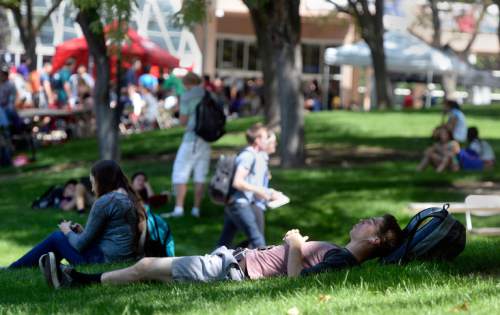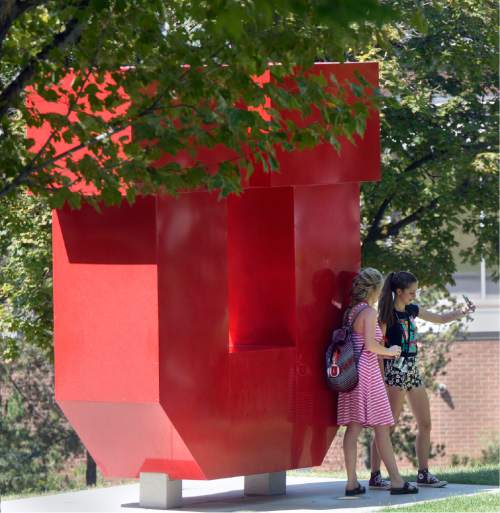This is an archived article that was published on sltrib.com in 2016, and information in the article may be outdated. It is provided only for personal research purposes and may not be reprinted.
A Utah lawmaker wants colleges to face prosecution if they deny students' First Amendment rights.
While free-speech protection is older than Utah's universities, some student groups in recent years have had to fight to express their views on the public properties.
"It's crazy, it's frustrating," bill sponsor Kim Coleman said, "to think that in 2015, that a public university would limit political speech." She points to last year's legal victory for a libertarian-leaning student group that sued after Dixie State University squelched its protests and satirical portraits of President George W. Bush, Che Guevara and President Barack Obama. The St. George university has since redrafted its policies with help from the Utah attorney general's office.
Colleges should retain only limited checks on student expression, Coleman said. While some schools have designated "free-speech zones," that's a concept Coleman says should apply to campuses in their entirety, with what she calls reasonable restrictions on when, where and how loud or obtrusive demonstrations can be.
Another bill, still being drafted, would ensure professors' abilities to address contentious topics in class.
Many higher-education leaders agree that free speech is key to academic freedom, but some say the reforms should steer clear of the courts.
"Our resources ought to be spent on education, not litigation," said Higher Education Commissioner Dave Buhler, adding that his office is working with Coleman to hammer out the details on her trio of pending bills. Buhler believes they are "well-intentioned" but could have "unintended consequences."
Coleman says schools in Utah have unconstitutional policies that haven't been reviewed by a court.
The West Jordan Republican is sponsoring a third measure that would prohibit one student from targeting another based on discrimination related to race, nationality, disability, religion, age, gender or sexual orientation. Such speech would violate the proposed law only if it undermines a student's ability to learn and is deemed severe, pervasive and objectively offensive — standards that have been backed by courts around the country.
Sen. Jim Dabakis said he agreed with the idea of statewide standards backing students' rights to speak out.
"If there is a place where free speech ought to be vociferous and loud and rude," it's college campuses, he said. But, the Salt Lake City Democrat added, the anti-discrimination component also may be necessary. "It's hard when you get down to specific bullying and a group of students attacking an individual student."
The effort is not unique to Utah. Missouri passed a similar law in the summer, working with the Foundation for Individual Rights in Education. The student free-speech group also represented the Dixie students and guided Coleman's drafts.
But Coleman's bill "appears to be in conflict with the federal law that governs our free speech," said Barbara Snyder, vice president of student affairs at the University of Utah.
In 2013, federal education officers tightened regulations on campus expression by bringing speech under the umbrella of sexual harassment.
Snyder added she believed Coleman's proposal to be "unwise."
The measures would hold schools liable to address harassment and allow expression, subjecting them to prosecution by the Utah attorney general. If a college were to lose its case in court, it would have to award $1,000 to victims of harassment, $500 to those denied access to free speech, and potentially more in legal fees and other damages.
The move to clear up students' rights comes on the heels of a number of speech conflicts on Utah campuses last year.
Utah State University is rewriting its policy after police told anti-abortion protesters to scrub the chalk hearts they had drawn on a campus walkway in September. The same month, Utah Valley University campus police officers took down a sign backing gay rights, the student-run UVU Review reported.
The Orem school still requires students to get approval to post fliers, a university spokeswoman wrote in an email — the type of policy Coleman says must be retooled.
Nationally, some academics have argued against so-called trigger warnings designed to warn students of violent images and harsh ideas.
And the role of the media on college campuses has been under national debate. In January, the University of Missouri communications professor who called for "some muscle" to remove a student journalist from a protest against racism was charged with assault.
"One of their purposes," Coleman said of colleges and universities, "is to challenge students with new ideas."
The measures must be passed by the Senate and House, then signed by the governor to become law.
Twitter: @anniebknox













